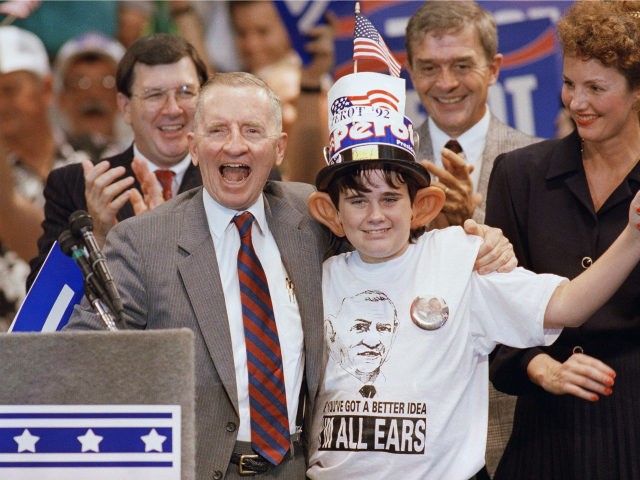Ross Perot, who passed away on Monday, rejected “free trade orthodoxy” while viewing those “harmed by lower wages as equal participants” in the American experiment, said Henry Olsen, Ronald Reagan biographer, Washington Post columnist, and senior fellow at the Ethics and Public Policy Center.
Olsen joined host Alex Marlow on Tuesday’s edition of SiriusXM’s Breitbart News Daily to discuss Perot’s legacy.
“I think that Perot’s legacy was incredibly underappreciated and incredibly important,” said Olsen. “He had his finger on the pulse of three or four important problems that both parties were not solving, and my argument is that he was an unconscious receptacle for the Reagan Democrats’ aspirations which [were a] strongly patriotic [and] conservative interpretation of Franklin Roosevelt’s New Deal.”
Perot also advocated for “reduced spending,” recalled Olsen, “but not the sort of radical solutions that either the left or right were supporting.”
LISTEN:
“Chasing the Perot voter after 1992 became the obsession with both parties over the next decade and created the centrism that pervaded the era,” added Olsen.
Olsen went on. “There’s a lot of resonance between Clinton’s new Democratic philosophy and Perot’s radical centrism, and I think what helped cause the 1994 Republican revolution was that Clinton won the presidency because he satisfied enough moderate people who as recently as July were willing to vote for Perot, and then he governed from what was then the left: He tried to bring about nationalized health care. He dramatically increased spending. He increased taxes. He passed what was then a radical pro-gay rights initiative in Don’t Ask Don’t Tell.”
“Perot voters swung massively to the Republicans,” continued Olsen, “and Clinton got the message, and he swung back to the center, [and] won enough of them back to win reelection. So [Ross Perot] was influential, but he was influential both in what Clinton forgot — which created Gingrich — and then in what Clinton remembered and learned.”
Perot’s appeal, stated Olsen, was rooted in his acknowledgment of the harm to persons and communities linked to manufacturing jobs and industries most affected by “free trade.”
“Free trade orthodoxy that both right and left establishment hold is astounding,” remarked Olsen. “People will not see the effect that Chinese competition — and to some extent, Mexican and other countries’ competition — has had on communities. They ascribe voter reaction in the Rust Belt to racism and crude populism, rather than a reasonable argument that they were being unfairly competed with, and they were citizens, too.”
Olsen noted, “The elite that benefit from lower wages do not see their fellow citizens who are harmed by lower wages as equal participants, and that is a major reason why Donald Trump is president today — because he did.”
“The competition for Perot voters pushed both parties to the center,” determined Olsen. “It meant to satisfy their bases, both parties had to champion extreme social causes. The religious right and the progressive left became major elements, and I think that’s a direct result of Perot’s success in pushing both countries to the economic center. And that contributed to the cultural polarization between the parties because you can compromise economic issues, but you cannot compromise the social issues that we’re fighting about, and that, in turn, was another reason why Donald Trump became president, because people are sick of the fighting between two parties who just can’t talk to each other.”
Breitbart News Daily broadcasts live on SiriusXM Patriot 125 weekdays from 6:00 a.m. to 9:00 a.m. Eastern.
Follow Robert Kraychik on Twitter @rkraychik.

COMMENTS
Please let us know if you're having issues with commenting.